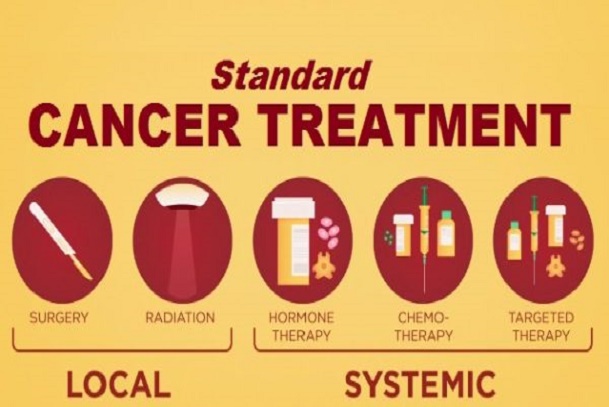Once cancer is diagnosed, it is important for the doctor to determine the extent (stage) of the cancer. He/she uses the stage of the cancer diagnosis to determine the treatment options and chances of curing or surviving. After a cancer diagnosis, people with cancer and their families have to make a number of decisions about treatment. These decisions are complicated by feelings of anxiety, unfamiliar words, statistics, and a sense of urgency. But unless the situation is extremely urgent, take time to research your options, ask questions, and talk with family or a trusted friend.
Cancer treatments are many and available but it requires careful consideration of evidence-based options, which can include more than one of the major therapeutic modalities: surgery, radiotherapy and systemic therapy. The best selection should be based on evidence of the best existing treatment given the resources available.
Also it is important to understand the side effects, benefits and risks included before a patient can choose the best palliative option for him/her.
The different type of cancer treatment includes:
- Surgery: The goal of surgery is to remove the cancer or as much of the cancer as possible, and this often requires cuts through skin, muscles, and sometimes bone. After surgery, these cuts can be painful and take some time to recover from.
- Chemotherapy: Chemotherapy is using drugs to kill cancers. Chemotherapy works by stopping or slowing the growth of cancer cells, which grow and divide quickly. Chemotherapy is used to Chemotherapy can be used to cure cancer, lessen the chance it will return, or stop or slow its growth; and also used to shrink tumors that are causing pain and other problems.
- Radiation Therapy: Radiation therapy uses high – powered energy beams, such as X-rays, to kill cancer cells. Radiation treatment can come from a machine outside the body (external beam radiation) or it can be placed inside the body (this is called brachytherapy). At high doses, radiation therapy kills cancer cells or slows their growth by damaging their DNA. Cancer cells whose DNA is damaged beyond repair stop dividing or die. When the damaged cells die, they are broken down and removed by the body.
Radiation therapy does not kill cancer cells right away. It takes days or weeks of treatment before DNA is damaged enough for cancer cells to die. Then, cancer cells keep dying for weeks or months after radiation therapy ends.
- Bone Marrow Transplant: Bone marrow transplant is also known as a stem cell transplant. The bone marrow is essential for making blood cells, and any form of its transplant can be made using the patient or a donor cells. These transplants are procedures that restore blood-forming stem cells in people who have had their destroyed by the very high doses of chemotherapy or radiation therapy that are used to treat certain cancers.
- Immunotherapy: This is also known as biopsy therapy, which uses the body immune system to fight cancer. The body immune system may inhabit cancer for a long time without the body recognizing it as cancer. Yet, immunotherapy can help the body system locate the cancer and fight it.
Several types of immunotherapy are used to treat cancer. These treatments can either help the immune system attack the cancer directly or stimulate the immune system in a more general way.
Types of immunotherapy that help the immune system act directly against the cancer include:
- Checkpoint inhibitors, which are drugs that help the immune system respond more strongly to a tumor. These drugs do not target the tumor directly. Instead, they interfere with the ability of cancer cells to avoid immune system attack.
- Adoptive cell transfer, which is a treatment that attempts to boost the natural ability of your cells to fight cancer.
- Monoclonal antibodies, also known as therapeutic antibodies, are immune system proteins produced in the lab. These antibodies are designed to attach to specific targets found on cancer cells. Some monoclonal antibodies mark cancer cells so that they will be better seen and destroyed by the immune system, and these are a type of immunotherapy.
- Treatment vaccines, which work against cancer by boosting your immune system’s response to cancer cells. Treatment vaccines are different from the ones that help prevent disease.
- Clinical Trials: These are present day studies used to investigate new ways of treating cancers. A clinical trial is a research study that involves volunteers. These types of studies help doctors find better treatments for cancer and other diseases
All types of cancer treatments can really have a large significant in the lives of both the patients and their families psychologically and financial, yet it is important to know the best and suitable way in diagnosing and treating cancer once it is detected.
 Wash your hands regularly and wear a face mask.
Learn more
Wash your hands regularly and wear a face mask.
Learn more
